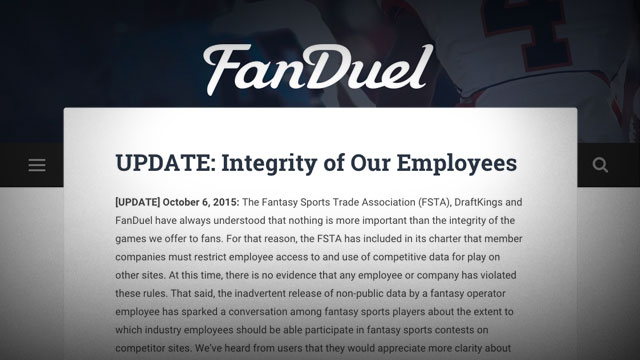Daily fantasy sports is quaking in the aftershocks of its first significant, public controversy.
Last week, picking up on a thread started on the RotoGrinders forum, DFSReport published an article detailing how a DraftKings employee’s gaffe highlighted multiple data security vulnerabilities. From there, the story has metastasized into fodder for network television morning shows and headlines in major daily newspapers hurling allegations of insider trading.
Perhaps inevitably, the reverberations have also been felt on Capitol Hill, where a Congressional hearing on daily fantasy sports was requested last month.
What happened
On Sept. 27, a DraftKings employee, Ethan Haskell, posted an article containing the ownership percentages of players before all games on the NFL slate were under way. Ownership percentages are considered valuable information, especially in large tournaments where finding lightly owned NFL players who produce big numbers can carry fantasy participants to massive prizes.
Deepening the controversy, Haskell won $350,000 on FanDuel that week. That has led to speculation that Haskell had used confidential information from DraftKings to build his lineup on FanDuel. DraftKings has said that no evidence of wrongdoing has been found, and that Haskell did not receive the ownership percentages until after lineups were locked on FanDuel.
Their defense is plausible. Players regularly scan publicly available ownership information from FanDuel NFL contests that open on Thursday night to predict weekend percentages, and these would seemingly be an equal or better predictor than data from a different site with different scoring and pricing.
“I don’t think there’s as much shady business as some people say, but that said, the sites have got to be better than what they’re doing,” Dan Back said on his RotoGrinders podcast on Monday. “They’ve got to be better than they are right now. Let’s point the finger here; both FanDuel and DraftKings have to realize at this point in time there are more eyes on them than there will ever be. When you saturate the market with the amount of advertising that they have, suddenly you become targets of anyone and everyone. … You’ve got to be on top of everything, and the sites are not.”
In the minds of many, the broader issue the saga has brought to light is the depth of information that is simply not available to the public in daily fantasy’s current unregulated environment.
Who has access to information and when? What safeguards do sites have in place to prevent malfeasance among its employees? How can sites prevent employees from using or distributing information for personal gain?
There is no option on these matters but to take the operators at their word, and to date, they’re not saying much.
The fallout
Monday morning FanDuel and DraftKings addressed the issue with nearly identical statements on their respective sites, but provided few meaningful details.
As the controversy spread over the course of the next 12 hours, the sites apparently saw the need for a stronger reaction and in conjunction with the Fantasy Sports Trade Association on Monday night released a joint statement declaring that employees would be temporarily banned from playing in real-money fantasy contests online.
At this stage it’s too early to tell what effect these developments might have on the nascent industry. Daily fantasy has experienced a meteoric rise over the past 12 months and projections from industy analysts have called for growth to continue.
But there are obstacles, and a mounting distrust from the general public is perhaps chief among them.
Judging unscientifically from the chatter on Twitter and various online forums, players seems split on the issue. Some echo Back’s feelings and don’t seem worried about the possibility of widespread improprieties. Others are nervous.
“I think it’s potentially the biggest concern yet,” a Kentucky-based player who wished to remain anonymous told DailyFantasyTalk. “The fact that someone on the inside is cheapening my entries by using ownership percentages that I don’t have access to in multi entry GPPs makes me take pause. It certainly has me questioning whether or not I should continue to play on the sites in question at a minimum.”
It appears likely that the controversy will soon reach the U.S. Congress. New Jersey congressman Frank Pallone, a self-described advocate for legal sports betting, has called daily fantasy’s legal standing into question and requested a congressional hearing on the topic. On Tuesday, ESPN’s David Purdum reported that officials from the House Energy & Commerce Committee which oversees professional sports and gambling will be discussing the impact of the scandal.
One possible—if not likely—outcome of Congressional scrutiny is eventual government oversight and regulation of the DFS industry. Daily fantasy operators have pushed back against increasing calls for external controls, preferring to rely on self-policing measures. Many are taking the recent events as evidence that those internal policies and enforcement mechanisms are insufficient.
“The recent scandal could not have come at a worse time for an industry that enjoyed the idea of internal self-regulation,” attorney Marc Edelman told DailyFantasyTalk. “Because it showcases at least one more instance of a lack of institutional control at one of the very large industry players.
“In my opinion, self-regulation of an industry is never a good idea, whether we’re talking about big banks or daily fantasy sports. I have never seen an instance in which self-regulation of an industry of any type has succeeded, and especially when there’s access to proprietary information, some form of oversight would seem to have great importance for maintaining the industry’s integrity.”
The daily fantasy sports industry could opt to create an independent, non-governmental body to function as a de facto regulator, but there’s been no evidence thus far that such a project is in the works. The Fantasy Sports Trade Association has a charter for paid-entry operators that includes a list of best-practices, but no formal means of enforcement. The group has said previously that it preferred not to act as an investigative overseer, and declined to comment further Monday night.
